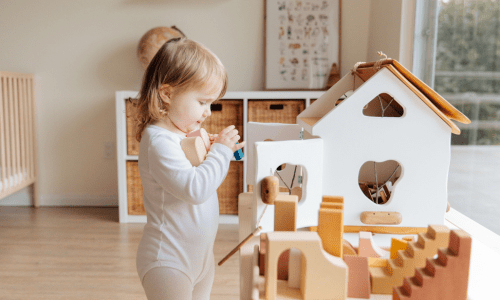Parenthood is an exciting and challenging journey, especially for new parents. Caring for a newborn requires knowledge, patience, and much love. As a new parent, having questions and concerns about providing the best care for your little one is natural. This article explores ten essential baby care tips every new parent should know. These tips cover various aspects of infant care, including safety, feeding, routines, hygiene, sleep, vaccinations, health issues, development, and self-care. Let’s dive in!
-
Table of Contents
Creating a Safe Environment for Your Baby
Ensuring your baby’s safety is of utmost importance. Start by baby-proofing your home, securing electrical outlets, and keeping hazardous substances out of reach. Additionally, maintain a comfortable and safe temperature in the baby’s room, and ensure proper ventilation to promote fresh air circulation. Regarding sleep, follow safety guidelines, such as placing your baby on their back in a crib without loose bedding or stuffed toys.
-
Feeding and Nutrition
Feeding your baby is crucial for their growth and development. Consider breastfeeding, as it provides numerous health benefits for both the baby and the mother. Seek guidance from lactation consultants or healthcare professionals to ensure proper breastfeeding techniques. If breastfeeding isn’t an option, follow safe and hygienic bottle-feeding guidelines. Gradually introduce appropriate solid foods as your baby grows, and consult your pediatrician for guidance.
-
Establishing a Routine
Babies thrive on routines, as they provide a sense of security and predictability. Establish a regular schedule for feeding, sleeping, and playtime. Consistency is vital in practice, but be flexible to accommodate your baby’s changing needs. Having well-structured training helps your baby feel secure and promotes healthy development.
-
Maintaining Good Hygiene
Proper hygiene practices are essential for keeping your baby clean and healthy.
When it comes to maintaining good hygiene for your baby, it’s essential to establish a bathing routine that suits their needs. Use mild, baby-friendly products and ensure the water temperature is comfortable. Pay special attention to cleaning the diaper area, and always use gentle wipes or a soft cloth. Proper diaper-changing techniques are crucial to prevent rashes and infections. Also, carefully handle baby clothes and toys, ensuring they are clean and sanitized regularly.
-
Promoting Healthy Sleep Habits
Adequate sleep is essential for your baby’s growth and overall well-being. Create a calm sleep environment by dimming the lights, playing soothing music, or using white noise machines. Establish a bedtime routine that includes bathing, reading a story, or singing lullabies. Consistency is vital in helping your baby associate these activities with sleep time. It’s important to note that babies have different sleep patterns, so be prepared for night awakenings and be patient as you help them develop healthy sleep habits.
-
Ensuring Proper Vaccinations
Vaccinations play a vital role in safeguarding your baby’s health. Stay informed about the recommended vaccination schedule and consult your pediatrician to ensure your baby receives the necessary immunizations. Vaccinations protect your little one from various diseases and help build immunity. Discuss any concerns or questions you may have with your healthcare provider.
-
Managing Common Health Issues
Babies are susceptible to common health issues, such as fevers, coughs, and colds. It’s essential to familiarize yourself with the signs of illness in babies and know when to seek medical attention. Follow your pediatrician’s advice regarding fever management and appropriate medications for common ailments. Always consult a healthcare professional if you need clarification or if your baby’s condition worsens.
-
Stimulating Your Baby’s Development
Babies are constantly growing and developing. Engage in age-appropriate activities that stimulate cognitive, physical, and social development. Play games, sing songs, read books, and provide toys encouraging exploration and learning. Tummy time is crucial for strengthening muscles and promoting motor skills. Regularly interact with your baby through eye contact, talking, and responding to their cues. These activities foster bonding and support your baby’s overall development.
-
Taking Care of Yourself as a New Parent
While caring for your baby, it’s essential to prioritize self-care. Parenthood can be physically and emotionally demanding, so take breaks, rest, and seek support when needed. Accept help from family and friends, and don’t hesitate to ask for assistance. Take time for activities that rejuvenate you, such as exercise, hobbies, or spending time with loved ones. Remember, taking care of yourself enables you to provide the best care for your baby.
-
Conclusion
Being a new parent comes with challenges, but with the proper knowledge and guidance, you can confidently navigate this beautiful journey. By following these ten essential baby care tips, you’ll be well-equipped to provide your little one with a safe, nurturing, and loving environment. Remember, every baby is unique, so adapt these tips to suit your baby’s individual needs. Embrace the joys of parenthood and cherish the precious moments with your growing baby.
FAQs (Frequently Asked Questions)
When should I start baby-proofing my home?
It’s best to start baby-proofing your home before your baby crawls, usually around six to eight months. However, it’s always early enough to ensure a safe environment for your little one.
How often should I bathe my newborn baby?
A sponge bath two to three times per week is sufficient for newborns. As your baby grows, you can gradually transition to regular baths but remember to use mild, baby-friendly products and maintain a comfortable water temperature.
What are some signs that my baby is ready for solid foods?
Symptoms that your baby is ready for solid foods include reasonable head control, sitting upright with support, showing interest in food, and swallowing. Consult with your pediatrician for guidance on introducing solid foods.
How can I help my baby sleep through the night?
Establishing a consistent bedtime routine, creating a soothing sleep environment, and responding to your baby’s sleep cues can help promote longer stretches of sleep at night. However, it’s important to remember that babies have different sleep patterns, and it’s normal for them to wake up during the night.
How can I find support as a new parent?
Seek help from family, friends, or parenting support groups. Joining local parent communities, attending parenting classes, or connecting with other new parents online can provide valuable resources, advice, and a sense of community.
Summary
Caring for a baby can be exciting and challenging for new parents. By following these ten essential baby care tips, you’ll be well-prepared to provide the best care for your little one. Remember to create a safe environment, focus on feeding and nutrition, establish routines, maintain good hygiene, promote healthy sleep habits, stay up-to-date with vaccinations, manage common health issues, stimulate your baby’s development, and prioritize self-care. Enjoy the journey of parenthood and embrace the special moments with your growing baby.
Community.




